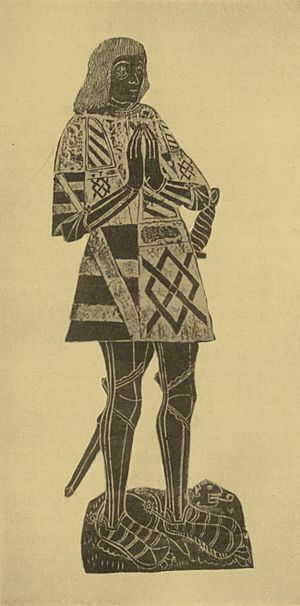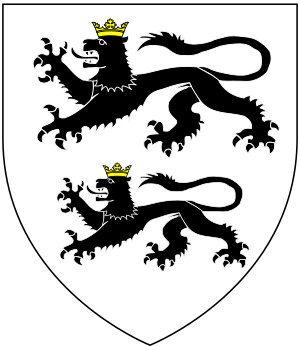William Catesby facts for kids
William Catesby (born 1450 – died August 25, 1485) was an important advisor to Richard III of England. He held significant jobs during Richard's time as king. These included being the Chancellor of the Exchequer, which is like a finance minister, and the Speaker of the House of Commons. The Catesby family became very wealthy from livestock farming. William Catesby's career marked the highest point of their political power.
Contents
Who Was William Catesby?
William Catesby was the son of Sir William Catesby. His father lived in Ashby St Ledgers, Northamptonshire, and passed away in 1478. His mother was Philippa, who inherited a lot from her father, Sir William Bishopston. William Catesby studied law at a famous place called the Inner Temple.
Early Career and Family Life
As a young lawyer, Catesby started working for William, 1st Lord Hastings. He married Margaret, who was the daughter of William La Zouche. They had three sons together. When his father died, William Catesby inherited many large properties in the middle of England. He also managed land for many other people.
Working for the King
William Catesby was part of the council that ruled when Edward V was king. After Richard III became king, Catesby became one of his closest advisors. He was given the important job of Chancellor of the Exchequer. This role meant he was in charge of the king's money.
Speaker of the House of Commons
Catesby also served as the Speaker of the English House of Commons. This was during the Parliament meeting in 1484. He represented Northamptonshire in Parliament. King Richard also gave him a lot of land. This made Catesby richer than most other knights.
The Battle of Bosworth Field
William Catesby was one of two advisors who told King Richard that marrying Elizabeth of York could cause problems. They warned him it might lead to rebellions in the north of England. Catesby fought alongside King Richard at the Battle of Bosworth Field. This was a very important battle.
Capture and Execution
During the battle, William Catesby was captured. He was one of the few important people who were executed after the battle. He was put to death three days later in Leicester. Before he died, he wrote a will. In it, he asked some people to "pray for my soul as ye have not for my body, as I trusted in you." This suggests he felt let down by them.
What Happened Next?
After William Catesby's death, most of his land was taken by Henry VII. Henry VII became the new king. William Catesby's oldest son, George, took over as the head of the family. The family home in Ashby St Legers was later given back to him. A famous person named Robert Catesby, who led the Gunpowder Plot, was a descendant of William Catesby.
 | Jessica Watkins |
 | Robert Henry Lawrence Jr. |
 | Mae Jemison |
 | Sian Proctor |
 | Guion Bluford |



